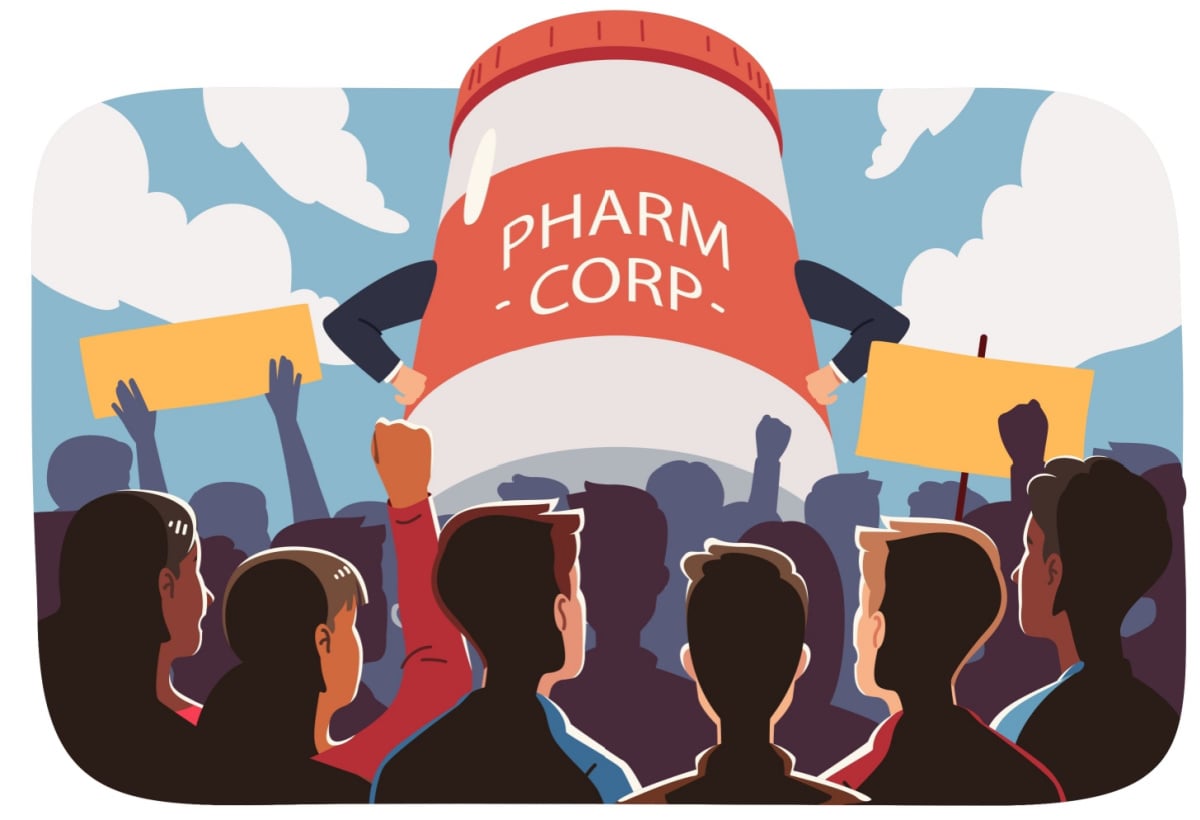Antitrust laws are put in place to prevent unlawful activities like price fixing, as well as monopolies from forming, typically tied to big pharma. If these powerful companies were to swallow smaller biotechs in an attempt to fix prices, it would stifle competition, result in limited options for consumers, thereby leading to a rise in prices, and a slump in innovation, according to antitrust regulators.
While you may have heard of tech giants like Microsoft, Apple and Meta getting caught up in antitrust scandals, big pharma is no less involved in antitrust litigations. Tactics like ‘pay for delays,’ that puts off generic drugs from entering the market can collide with antitrust laws. For instance, Gilead Sciences thwarted the entry of generic versions of its HIV drugs, that would’ve been sold at lower rates to consumers. Although Gilead, along with Israeli company Teva Pharmaceutical, avoided having to shell out billions in damages to drug purchasers, they now have to pay a $246.8 million settlement over the delay.
Here are five instances where pharma giants came head-to-head with antitrust regulators, including over concerns of monopoly.
Boehringer Ingelheim among others in price fixing scandal
In a price fixing conspiracy, a €13.4 million ($14.1 million) fine has been slammed against five pharmaceutical companies, one of them being German multinational biopharma Boehringer Ingelheim, by the European Commission (EC), last week. Price fixing deters competition as those involved tend to control the supply and demand of the product, and deprives consumers of options.
The companies were reportedly running a cartel to dominate the market for a pharmaceutical ingredient called N-butylbromide scopolamine/hyoscine (SNBB), which is a key compound in antispasmodic drugs that can relieve stomach cramps. This case is a first for the EC sanctioning a pharmaceutical cartel over a drug ingredient.
Six companies, Alkaloids of Australia, Alkaloids Corporation, Boehringer Ingelheim, Linnea Transo-Pharm and C2 Pharma, participated in fixing the minimum sales price of SNBB, in a move to restrict competition, spanning from 2005 to 2019 – although Boehringer and C2 Pharma ended their involvement in 2014 and 2016 respectively.
It all came to light when whistleblower C2 Pharma snitched on its fellow cartel controllers, after which it was awarded immunity, with not even a slap on the wrist, owing to the Commission’s leniency programme.
However, the investigation continues, as a seventh company, Alchem, chose not to settle.
FTC vs. Actavis: a landmark case of big pharma monopoly
The case that set the precedent for more than 30 cases, which brought the intersection between antitrust law and patent infringement to the spotlight, FTC vs. Actavis was an antitrust case that took place a decade ago.
It all began when multinational drug company Solvay Pharmaceuticals, whose steroid hormone Androgel used to treat hypogonadism – when the gonads produce little to no testosterone – in men, and gender dysphoria, obtained the patent for the drug twenty years ago.
Two companies, one of which was global pharmaceutical Actavis, had created generic versions of Androgel, which they wanted to bring to market. For this to happen, Actavis filed a patent for its generic drug. This led to Solvay suing Actavis under patent infringement laws. However, the U.S. Food and Drug Administration (FDA) gave the green light for Actavis to commercialize its generic Androgel drug, after a three-year battle over patency.
But, in a turn of events, Actavis instead joined hands with Solvay in a reverse payment settlement agreement. A reverse payment settlement agreement, also known as pay-for-delay agreements, is when a company that sues another company over patent infringement rights – in this case, Solvay – pays the latter, to hold up the generic version’s entry into the market. This is used to settle pharmaceutical patent infringement cases without having to involve the courts.
According to the multi-million dollar settlement, Actavis would hold up the arrival of its generic steroid drug for nine years – a duration that was shorter than Solvay’s Androgel patent.
Following this, the U.S. Federal Trade Commission (FTC) – an independent agency that enforces antitrust laws – sued all the parties involved in the deal, claiming that it violated antitrust laws. Actavis and Solvay countered the claims, stating that these kinds of patent-related settlements are immune from antitrust challenges, especially since the period until when the generic versions are held back from being commercialized, ends before the Androgel patent expires. This claim was in accordance with a patent law clause in the U.S. that said that a patent owner has the right to exclude other players from the market, from selling its products.
While this led to the District Court, as well as the U.S. Court of Appeals for the Eleventh Circuit, dismissing the case, the Supreme Court (SC) held that the FTC could make an antitrust challenge under the rule of reason – which argues that in the case of possession of a monopoly, only if anti-competitiveness outweighs pro-competitive effects, will it be regarded as an unlawful restraint of trade.
Although in the end, it was a 5-3 majority at the court, with the SC rejecting the ‘rule of presumptive illegality’ backed by the FTC, it turned the tide on reverse payments that strolled into antitrust territory.
Joe Simons, chairman of the FTC said in a press release: “After the Supreme Court recognized the harmful effects that reverse-payment agreements can have on competition and ultimately on consumers, we have seen fewer of these types of agreements.”
Big pharma Amgen completes Horizon takeover after FTC brawl
A more recent case that has to do with big pharma monopolies, is one involving biotech giant Amgen, and its recent multi-billion dollar acquisition of Irish healthcare company Horizon Therapeutics.
Horizon’s two blockbuster drugs, Tepezza, for the treatment of thyroid eye disease – a disorder that causes inflammation and damage to the tissues around the eyes – and Krystexxa, a therapy for chronic refractory gout – a rare form of arthritis that is caused by the buildup of uric acid in the blood – set foot into the market in 2020 and 2010.
Earlier this year, when the FTC sought to block Amgen from gaining control over Horizon, it claimed that the acquisition would enable the multinational to use rebates on its existing drugs to “pressure insurance companies and pharmacy benefit managers” into favoring the two Horizon drugs.
According to the FTC, this meant that it would make it difficult for Tepezza and Krystexxa competitors to match the level of rebates that Amgen would be able to offer, silencing budding rivals.
“Rampant consolidation in the pharmaceutical industry has given powerful companies a pass to exorbitantly hike prescription drug prices, deny patients access to more affordable generics, and hamstring innovation in life-saving markets,” said Holly Vedova, former director of the Bureau of Competition. “The FTC won’t hesitate to challenge mergers that enable pharmaceutical conglomerates to entrench their monopolies at the expense of consumers and fair competition.”
To assuage the FTC’s concerns, Amgen signed a consent order agreement with the antitrust watchdog, which prohibits the biotech from bundling its products with Horizon’s blockbuster drugs.
The move thereby helped clear the path for Amgen to purchase Horizon for $27.8 billion.
Pfizer and the EpiPen controversy
Pfizer, whose life saving medicine against anaphylaxis is popularly known as the EpiPen, came under antitrust investigation with American lawmakers, and will now pay $50 million to settle the claims.
The lawsuit, dating back to 2020, was brought to a federal court in Kansas in the U.S., when allegations that the American multinational company, and Mylan – the company that commercializes EpiPens – were in cahoots with Teva Pharmaceuticals to stall the generic version of the medicine from making its way into the market.
According to the lawsuit, Mylan and Teva agreed to delay the entry of their respective drugs, where Mylan held up the generic version of Teva’s wakefulness drug Nuvigil and, in turn, Teva delayed its generic EpiPen from hitting the market. This enraged customers, particularly as the price of EpiPens shot from $100 in 2008 to $600 in 2016, further highlighting the issue of a pharma monopoly. This meant that customers who could’ve paid less for the generic version, had to continue purchasing EpiPens at the cost of $600.
And, as a result, this $50 million settlement was following a $345 million payment to consumers and insurers, who claimed that they overpaid for EpiPens – a case that the federal court had initially dismissed.
Double whammy for Illumina
While Illumina has been making headlines lately, with investor Carl Icahn suing the DNA giant following a proxy battle, it traces back to an acquisition deal that misfired not too long ago.
When the multinational biotech had spun out cancer test maker Grail, based in California in the U.S., in 2016, the company went on to develop a technology that would allow the early detection of a range of cancers. Then, three years ago, Illumina announced that it would buy the company back for $7.1 billion. But this was not welcomed by the FTC who claimed that the acquisition would halt innovation in the multi-cancer early detection space in the U.S..
The European Union (EU) antitrust regulators also aimed to throw a wrench into the deal by leading a full-scale probe, citing that the buyout would stifle competition. They were worried that Illumina might raise prices or refuse to offer its famed DNA sequencing services to Grail’s rivals.
But that didn’t stop Illumina from making the purchase in August 2021.
This angered the antitrust watchdogs on both sides of the Atlantic, with the FTC calling for Illumina to undo the merger, and the EU resuming its investigation after a two-month hiatus.
Illumina criticized EU regulators for intervening, claiming that they did not have jurisdiction over the Grail deal since the cancer detection company did not have operations in Europe.
After about a year-long back and forth with antitrust law enforcers, the EU ordered Illumina to divest Grail.
Earlier this year, Illumina challenged the divestiture, and then in June, it appealed against the FTC’s order as well.
The biotech was then slapped with a €432 million (($476 million) fine by the EU, for jumping the gun and acquiring Grail before the probe was completed. This month, the European Commission demanded for the divestiture to happen in 12 months, with the company retaining up to 14.5% stake in Grail.
However, Illumina, which has challenged the EU’s decision at the European Court of Justice, looks to wait out the court case before it bids farewell to Grail. The whole ordeal was followed by American activist investor Icahn’s class-action suit, which was compounded by clashes within the company.
While this is Illumina’s most contentious deal yet, which saw a drop in stocks, it had failed another acquisition in 2019, owing to similar claims over competition by the FTC, when it had tried to buy American sequencing company PacBio.
Other noteworthy antitrust cases of big pharma monopolies
The pharma industry has gained a reputation for being run by monopolies that tend to claim market control. Only this year, American biopharma Merck, was under the watchful eye of regulators in the U.S., when it announced that it would purchase precision medicine company Prometheus Biosciences. While Merck inked the $10.8 billion takeover, since the government’s waiting period for the acquisition had expired, in a separate case, it reached a $70 million settlement along with Indian company Glenmark Pharmaceuticals. This was over claims that the two companies plotted to detain the generic version of Merck’s anti-cholesterol drug Zetia from being launched.
Apart from Merck, Swiss pharma giants, Novartis and Roche were also under antitrust scrutiny for several years, with concerns related to potential monopoly practices. French competition regulator Autorité de la Concurrence, hit the companies with €444 million ($475 million), after it claimed that the biotechs abused their power to push the expensive drug Lucentis – which is distributed by the two companies in the U.S. and Europe – for slowing vision loss, over a cheaper alternative.
What would have been the highest fine imposed by French antitrust authorities, the two companies were let off the hook after an appeals court in Paris ruled that they did not take advantage of their market dominance to drive Lucentis sales, earlier this year.
While calls for antitrust reforms get louder, a coalition of more than 30 life science companies that include Amgen, Gilead and Merck, are arguing that mergers and acquisitions can promote innovation. While the alliance Partnership for the US Life Science Ecosystem (PULSE) seeks to counter certain antitrust laws, it doesn’t seem like the regulators will back down, and the interplay might be something to keep an eye on.






















No Comments
Leave a comment Cancel